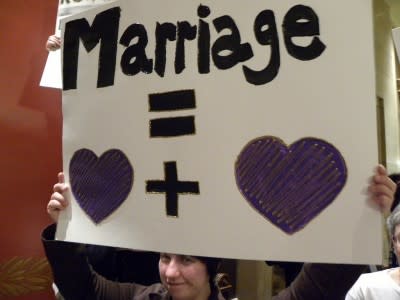Looking at gay marriage petitions in front of the Supreme Court
The Supreme Court may soon act on seven petitions about same-sex marriage bans in five states. So what are the constitutional arguments being made in the cases?
The nine Justices met behind closed doors on Monday to consider the appeals for lower federal courts. If four Justices agree that a case has merit, the full Court would hear arguments from the plaintiffs and defendants in the term that starts on Monday, October 6.
The Justices could hear one or more of the cases, or wait to accept the cases based on the outcome of more cases in the federal court system. In particular, a case in front of the Sixth Circuit appeals court could uphold a state ban on same-sex marriages – that could accelerate the Court’s efforts to decide the gay marriage issue.
Here is a look at the cases in five states in front of the Supreme Court, and two sets of cases yet decided in federal appeals court that could become part of the mix.
The cases in front of the Supreme Court
1. Kitchen v. Herbert (10th Circuit)
The appeals petition was filed on August 5, 2014 after the 10th Circuit Appeals Court ruled that Utah’s same-sex marriage ban was unconstitutional. The appeals court relied on the Supreme Court’s reasoning from the 2013 case of United States v. Windsor, which struck down the Defense of Marriage Act (or DOMA).
The question posed to the Supreme Court is, “Whether the Fourteenth Amendment prohibits a state from defining or recognizing marriage only as the legal union between a man and a woman.”
The Court, if it accepts the case and the question, could rule on two issues: if Utah’s ban is legal and if Utah has to recognize same-sex marriages from other states. Both sides in the case want the questions answered.
2. McQuigg v. Bostic (Fourth Circuit)
In a petition filed on August 29, the two sides in Virginia want the Court to settle the question of if “the Due Process Clause and the Equal Protection Clause of the Fourteenth Amendment to the United States Constitution forbid the Commonwealth of Virginia from defining marriage as the union of a man and a woman.”
3. Rainey v. Bostic (Fourth Circuit)
This petition is linked to the McQuigg petition, and it asks “whether Virginia violates the Due Process and Equal Protection Clauses by denying the right of marriage to same-sex couples and by refusing to recognize same-sex marriages lawfully performed outside of Virginia.”
4. Schaefer v. Bostic (Fourth Circuit)
The third petition related to the state of Virginia asks “Whether the Fourteenth Amendment compels Virginia to license and recognize same-sex marriages.”
5. Smith v. Bishop (10th Circuit)
This case deals with the narrow question of, “Whether the Due Process Clause and the Equal Protection Clause of the Fourteenth Amendment to the United States Constitution forbid the State of Oklahoma from defining marriage as the union of a man and a woman.” This case had been in the lower court system for 10 years before the appeals petition made it to the Supreme Court in August.
6. Bogan v. Baskin (7th Circuit)
This case is about the same-sex marriage ban in the state of Indiana, and asks the questions of “Whether the Due Process and Equal Protection Clauses of the Fourteenth Amendment permit states to define marriage as a legal union between one man and one woman; and (2) whether the Due Process and Equal Protection Clauses permit states to treat as void same-sex marriages from other jurisdictions.”
7. Walker v. Wolf (7th Circuit)
On September 4th, 2014, the 7th Circuit ruled that Wisconsin’s marriage laws violated the U.S. Constitution. The question before the Supreme Court is “whether the Fourteenth Amendment prohibits a state from defining and recognizing marriage as only the legal union between one man and one woman.”
Cases in Federal Appeals Court
8. The 6th Circuit Court of Appeals. The court heard arguments about same-sex marriage bans in Michigan, Kentucky, Ohio and Tennessee in early August. The swing vote in the case is expected to be Judge Jeffrey Sutton. Sutton asked questions during hearings about a 1972 Supreme Court directive in a case called Baker v. Nelson, in which the Court affirmed a lower court decision that gay marriage didn’t pose “a substantial federal question.” If Sutton believes the Baker decision is still a precedent, the appeals court could likely uphold same-sex marriage bans.
9. The 9th Circuit Court of Appeals. The three-judge panel heard arguments about same-sex marriage bans in Idaho, Nevada and Hawaii last month. All three judges are Democratic appointees and the expectation is the court could rule in favor of same-sex marriages.
Recent Stories on Constitution Daily
Jeffrey Rosen interviews Justice Ruth Bader Ginsburg
Constitution Check: Is there a right to vote before election day?


